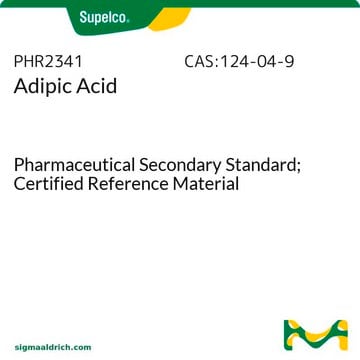Y0000110
Adipic acid
European Pharmacopoeia (EP) Reference Standard
Sinónimos:
Hexanedioic acid
About This Item
Productos recomendados
grade
pharmaceutical primary standard
agency
EP Reference Standard
vapor density
5 (vs air)
vapor pressure
1 mmHg ( 159.5 °C)
API family
adipic acid
autoignition temp.
788 °F
manufacturer/tradename
EDQM
bp
265 °C/100 mmHg (lit.)
mp
151-154 °C (lit.)
application(s)
pharmaceutical (small molecule)
format
neat
storage temp.
2-8°C
SMILES string
OC(=O)CCCCC(O)=O
InChI
1S/C6H10O4/c7-5(8)3-1-2-4-6(9)10/h1-4H2,(H,7,8)(H,9,10)
InChI key
WNLRTRBMVRJNCN-UHFFFAOYSA-N
¿Está buscando productos similares? Visita Guía de comparación de productos
General description
For further information and support please go to the website of the issuing Pharmacopoeia.
Application
Packaging
Other Notes
related product
signalword
Danger
hcodes
Hazard Classifications
Eye Dam. 1
Storage Class
11 - Combustible Solids
wgk_germany
WGK 1
flash_point_f
384.8 °F - closed cup
flash_point_c
196 °C - closed cup
Elija entre una de las versiones más recientes:
Certificados de análisis (COA)
Lo sentimos, en este momento no disponemos de COAs para este producto en línea.
Si necesita más asistencia, póngase en contacto con Atención al cliente
¿Ya tiene este producto?
Encuentre la documentación para los productos que ha comprado recientemente en la Biblioteca de documentos.
Nuestro equipo de científicos tiene experiencia en todas las áreas de investigación: Ciencias de la vida, Ciencia de los materiales, Síntesis química, Cromatografía, Analítica y muchas otras.
Póngase en contacto con el Servicio técnico






